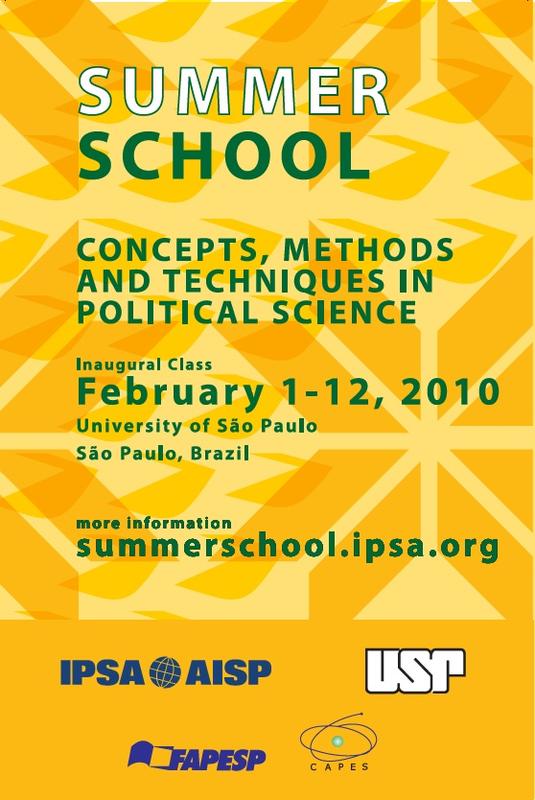 February 1-12, 2010
February 1-12, 2010
University of São Paulo
São Paulo, Brazil
The first IPSA São Paulo Summer School happened between February 1 and February 12, 2010. The School brought together nearly 90 students from around the world for six different courses in methodology. The 2010 IPSA Summer School’s first goal was to provide young scholars of social science in Brazil and other South American countries with access to high-quality, cutting-edge, advanced training in qualitative and quantitative social science methods. We have no doubt that this goal was fully accomplished. Despite the rush to get the Summer School up and running in less than four months, this inaugural Summer School gathered together top-notch students and excellent instructors for a truly dynamic two weeks together.
The Summer School established by a cooperative partnership between the International Political Science Association (IPSA) and the Department of Political Science and the Institute of International Relations at the University of São Paulo.
The Summer School received 87 students coming from 35 different institutions in 10 different countries. Around 40% of the students were enrolled in a PhD program, 28% in a master program and 19% were already faculty. The gender breakdown of enrolled students was one-third female (29); two-thirds male (58). The age was 32.
Classes were the primary activity during the Summer School, with class lectures every morning, followed by lab sessions, group activities, and study sessions in the afternoons.
During six of our ten nights together, students were also invited to participate in an Evening Lecture Series that was open to the public. At the Evening Lectures, each of the six instructors talked about their research, and a prominent local academic led discussions about the substantive and methodological implications. The Evening Lecture Series was very popular, bringing together both Summer School students and the local academic community in numbers that frequently surpassed 100 people.
There were few organized social events for all participants in the Summer School. However, we did hold an opening cocktail party on the first Monday of the Summer School, which proved to be an effective way to kick off the networking that the Summer School aims to encourage. Students also organized their own outings with each other, as well as with instructors. Instructors had a number of gatherings as a group, to discuss the Summer School as well as to show them the sights of São Paulo.
The Summer School was coordinated by:
Prof. Dirk Berg-Schlosser, Executive Director
Prof. Mathew Taylor, Local Organization Committee, Department of Political Science, University of São Paulo
Prof. Leandro Piquet Carneiro, Local Organization Committee, Institute for International Relations, University of São Paulo
The School offered the following courses:
- Game Theory
(Prof. Rebecca Norton, New York University) - Comparative research design and configurational comparative methods (Prof. Dirk Berg-Schlosser, Philipps University Marburg)
- Comparative survey design
(Prof. Bruno Cautrès, Sciencespo, Paris) - Multiple regression analysis
(Prof. Guy Whitten, Texas A&M University) - Methodologies of case studies
(Delia Schindler, Hamburg University) - Mixed methods design
(Prof. Max Bergmann, University of Basel)
Generous support for the Summer School was provided by the IPSA, by the Coordenação de Aperfeiçoamento de Pessoal de Nível Superior (CAPES), by the University of São Paulo, and by the Centro de Estudos da Metrópole (CEM/CEBRAP).

















